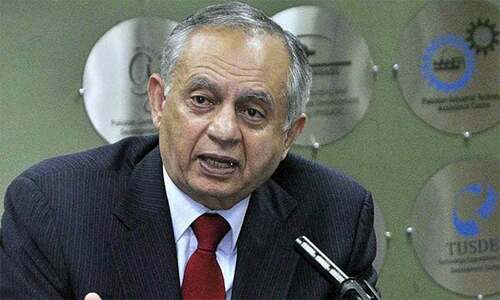PAKISTAN is on the verge of a massive gas crunch as temperatures begin to fall in most parts of the country, forcing the two public gas utilities to ration the fuel for cooking, heating, transport, electricity generation, industrial use, etc.
Like always, the gas shortages are going to impose significant costs on the economy, with the prime minister’s trade and industry adviser Abdul Razak Dawood forecasting a slowdown in the pace of export growth in December and beyond. Meanwhile, the energy minister, Hammad Azhar, has ‘assured’ exporters of a stable gas supply through winter. In return, the industry has agreed to shut down inefficient captive power plants and shift to the national power grid. Likewise, residential consumers have been promised unobstructed supply three times a day for cooking. However, such consumers are already complaining of ‘low gas pressure’ — a clear signal of a worsening fuel crunch — in many parts of the country.
Winter gas shortfalls have been a permanent part of life in Pakistan for almost the last decade and a half owing to growing demand and depleting domestic reserves. LNG imports since 2015 have only partially filled the domestic supply gap. This year, shortages are likely to aggravate because of uncertainty over LNG supply over the next few months on the back of soaring international prices. This may also affect power generation, say industry analysts. The sad part is that Mr Azhar appears more interested in challenging TV show hosts over LNG issues, instead of working on reducing the pain of gas consumers.
Read: Hammad Azhar vs Shahzeb Khanzada — Whose side is Twitter on?
Pakistan needs more gas. What should we do? Our gas troubles cannot be dealt with on a long-term basis without ramping up LNG imports and/or boosting domestic supplies. Regrettably, the government has failed on both counts. It has neither succeeded in boosting the LNG import-handling capacity nor invested in gas exploration for new local discoveries to overcome the crunch.
In the last three years, the entire policy focus has been on rationing gas — which accounts for more than half of the nation’s energy consumption — for different sectors rather than on increasing its supply. Turkey has largely overcome its gas crunch by developing adequate gas import facilities and building underground natural gas storages, besides implementing energy-saving actions to avoid wastage and to encourage the use of renewable energy.
With international prices of the super chilled fuel skyrocketing over supply disruptions, the LNG solution can indeed be very expensive for a country like Pakistan perpetually facing balance-of-payment troubles. But what alternative do we have — at least in the short to medium term till we are able to make new discoveries? None at all. Trade-offs can be even more expensive than LNG shipments; the economy will be forced to pay a higher price in terms of industrial productivity and exports because of the gas crunch than it would by importing the fuel.
Published in Dawn, November 20th, 2021


































